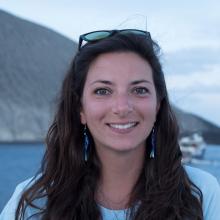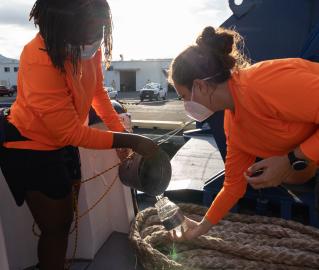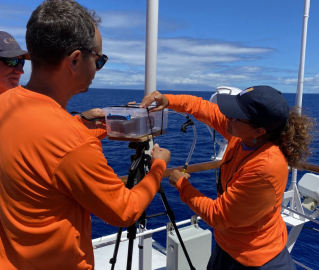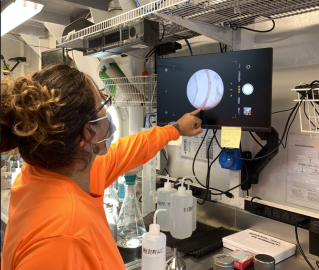
Tania Pelamatti
What is your history of engagement with the National Geographic Society?
National Geographic Explorer and Early Career Grant Recipient 2018
Tell us about your work/research. What kinds of things do you do?
I specialize in the monitoring of microplastics in different environmental matrices (water, sediment, and biota) in order to understand the interaction between plastic debris and the Mediterranean marine ecosystem. I previously studied the factors influencing the abundance of floating plastic in the Mexican Pacific Ocean and how microplastics can be a threat for filter-feeding megafauna such as Oceanic Manta Rays. I focused my research on the toxic pollutants that can be adsorbed on the surface of the tiny particles of plastics, investigating how they can be transferred to marine organisms once ingested. I am a Marine Biologist and during my master thesis I studied the reproductive biology and histology of the bat ray Myliobatis californica and I have a fascination for the incredible diversity of elasmobranchs reproductive strategies.
What sparked your initial interest in your career?
I was born in the Italian Alps and have always been fascinated by the natural world, from the mountains to the oceans. My uncle had a collection of National Geographic documentaries that we watched over and over again dreaming about coral reefs, tropical forests, and savannas. Since I was a child I have been particularly intrigued by marine wildlife and therefore I decided to pursue a career in marine biology.
What element of your work/study do you think is the most fascinating?
Having the opportunity to dive for work is in my opinion the best part of the Marine Biologist job! The most exciting thing I have done in my career is to have performed an underwater ultrasound on a pregnant oceanic manta ray in the open ocean. I helped another researcher with the underwater scanning of this massive 5+ meters wide manta ray that was interacting with our group of divers and let me get close enough with the probe to be able to see what she had in her belly: a baby manta ray wrapped in her pectoral fins like a burrito. A dive I will never forget!
What other jobs or skills led you to your current career?
Being a diver is not a requirement for Marine Biologists (some of us enjoy way more diving in a lab than in the open ocean!), but for sure it helped me a lot in developing the project I had dreamed of. Thanks to my experience in SCUBA diving I have been able to collect samples for my thesis in a safe manner and it has allowed me to have a deeper insight into the marine environment and its threats. Not only skills but attitude can be very important too: I am a positive, very energetic and extroverted person. I like to talk with people even if I don’t know them, and I believe my attitude has played a key role in my career. Networking is a fundamental part of the research process, and it has allowed me to cross paths with amazing people who have been essential in the development of my projects.
What are your degrees and hobbies?
Bachelor in Biology – University of Milan (Italy) 2012;
Master in Marine Biology – Polytechnic University of Marche UNIVPM (Italy) 2015;
PhD in Marine Sciences – Centro Interdisciplinario de Ciencias Marinas CICIMAR-IPN (Mexico) 2019;
Dive Master PADI 2015
What are your hobbies?
I love SCUBA diving, snorkeling, and exploring new seascapes as much as I can. I like rollerblading, especially with an ocean view. I love cooking and especially baking: pizza and cakes are my favorite and I have prepared them even in the middle of the ocean!
What advice would you give someone who wants to have a career like yours?
Find what you love and open your eyes in search of something that is passionate to you. Pursuing a career in Marine Biology can be tough sometimes, and without a strong passion for your field of study, it can be hard to continue on the track. Networking is essential and having plan A, B, C and D is always useful when something doesn’t go as expected. Be ready to adapt to new situations and build your own set of expertise, always keeping your objectives in sight. A smooth sea never made a skilled sailor nor a leading marine biologist!
Expeditions
Tania participated in the following Ocean Exploration Trust expeditions:



